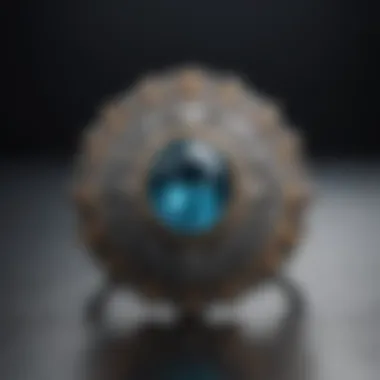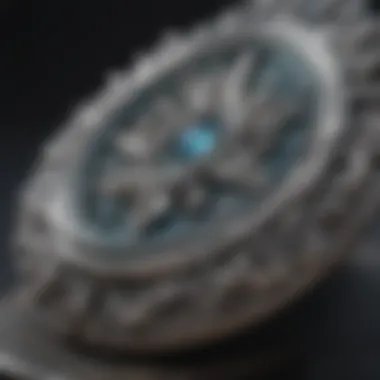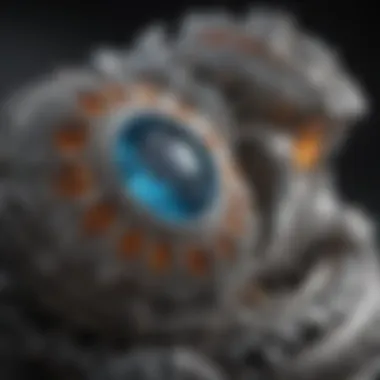Unveiling the Intrigues of PMC Silver Clay: A Comprehensive Guide


Overview of PMC Silver Clay
PMC Silver Clay is a remarkable material highly treasured by jewelry designers and artisans due to its exceptional qualities and versatility. This guide explores the intricate world of PMC Silver Clay, shedding light on its composition, properties, and various techniques employed in its manipulation. Offering valuable insights and practical knowledge, this article serves as a comprehensive resource for individuals interested in the art of crafting exquisite jewelry pieces.🌟
Introduction to PMC Silver Clay
PMC Silver Clay serves as a significant element in the realm of jewelry design, highly treasured for its exceptional properties and versatility. This section of the article aims to illuminate the essence of PMC Silver Clay within the broader landscape of crafting and artistry. Understanding the properties, composition, and working techniques associated with PMC Silver Clay is vital for enthusiasts and professionals alike. By delving into the intricacies of PMC Silver Clay, readers are poised to uncover a world where creativity meets craftsmanship in a unique and innovative manner.
What is PMC Silver Clay?
Exploring the essence of PMC Silver Clay unveils a remarkable material that revolutionizes the way jewelry is created. PMC, which stands for Precious Metal Clay, consists of fine silver particles mixed with an organic binder to create a malleable compound. It allows artists to mold and shape it with ease before undergoing a firing process that burns off the binder, leaving behind a pure silver object. This innovative material provides artists with a new dimension in jewelry making, combining the precision of traditional metalworking with the flexibility of clay manipulation, resulting in exquisite and bespoke creations.
History of PMC Silver Clay
The history of PMC Silver Clay traces back to the late 20th century when Japanese scientist Masaki Morikawa pioneered its development. His groundbreaking creation revolutionized the jewelry industry, offering artisans an alternative to traditional metal casting methods. PMC Silver Clay gained popularity for its ease of use and the ability to create intricate designs without the need for expensive equipment. Over the years, it has evolved into a staple material in contemporary jewelry design, captivating artists with its endless possibilities and remarkable finish.
Composition of PMC Silver Clay
PMC Silver Clay comprises elemental silver particles suspended in water and an organic, non-toxic binder. The binder provides the clay-like consistency necessary for shaping and molding before firing. Once fired at high temperatures in a kiln or with a torch, the binder burns off, leaving behind a pure silver object. The composition of PMC Silver Clay not only ensures a high-quality final product but also allows for intricate textures and designs that are difficult to achieve through traditional metalworking methods. Artists are drawn to PMC Silver Clay for its purity, ease of use, and the artistic freedom it offers in creating one-of-a-kind jewelry pieces.
Properties of PMC Silver Clay
PMC Silver Clay is a remarkable material that holds immense importance in the world of jewelry design and artistry. Its unique properties and composition set it apart from traditional metals, offering designers a wide array of creative possibilities. One of the key benefits of PMC Silver Clay is its ability to be shaped and molded like clay before transforming into pure silver when fired.
This versatile material allows jewelry makers to create intricate designs with ease, capturing delicate textures and details that may be challenging with other metals. Additionally, PMC Silver Clay can be seamlessly integrated with gemstones, adding a touch of elegance and sophistication to the final piece.


Designers must consider the firing process and shrinkage of PMC Silver Clay when working with this material. Understanding the temperature and duration required for firing is crucial to ensure the material transforms into solid silver while minimizing shrinkage. Careful planning and precise execution during the firing process are essential to achieve the desired shape and size of the final piece.
Firing Process and Shrinkage
The firing process of PMC Silver Clay is a critical step in realizing the full potential of this material. By subjecting the clay to high temperatures in a kiln or with a torch, the organic binders burn off, leaving behind pure silver. It is essential to follow precise firing guidelines to prevent cracking or warping of the piece.
Shrinkage is an inherent characteristic of PMC Silver Clay during the firing process. Designers need to account for this shrinkage allowance in their initial designs, ensuring that the final piece aligns with their envisioned dimensions. Through careful calculations and testing, artisans can predict and control the amount of shrinkage, resulting in accurately sized jewelry.
Texture and Working Characteristics
The texture and working characteristics of PMC Silver Clay play a significant role in the creative process. Designers can manipulate the clay to achieve various textures, from smooth to rough or even imitating natural materials like wood or stone.
The workability of PMC Silver Clay is another advantage, allowing artists to roll, shape, carve, and sculpt intricate details with ease. Its forgiving nature enables artists to make adjustments throughout the crafting process, providing room for experimentation and innovation.
Finishing and Polishing PMC Silver Clay
Precise finishing and polishing techniques are essential to bring out the luster and shine of PMC Silver Clay jewelry. After firing, the piece undergoes thorough polishing to remove any firing residue and achieve a flawless surface.
Artisans employ a variety of tools and methods, including sanding, buffing, and polishing compounds, to enhance the final appearance of the silver. By meticulously refining the surface texture and sheen, designers can elevate the aesthetic appeal of their creations, resulting in stunning and professional-looking jewelry.
Techniques for Working with PMC Silver Clay
In the vast world of PMC silver clay, understanding the techniques for working with this precious material is paramount. The ability to manipulate and shape PMC silver clay effectively can significantly impact the final outcome of a jewelry piece. By mastering these techniques, artisans can unleash their creativity and translate their visions into tangible works of art. It is crucial to delve into the intricacies of rolling, shaping, drying, preparing for firing, and the firing process itself to ensure that the PMC silver clay transforms into a stunning piece of jewelry.
Rolling and Shaping PMC Silver Clay


Rolling and shaping PMC silver clay require precision and expertise. Artisans need to carefully roll out the clay to achieve the desired thickness and texture for their jewelry pieces. Whether creating intricate patterns or simple designs, the rolling and shaping process sets the foundation for the final product. Moreover, attention to detail during this stage can determine the success of the piece during the firing process. Artisans must exhibit patience and skill to mold the PMC silver clay into exquisite shapes and forms that reflect their creative vision.
Drying and Preparing for Firing
Before firing PMC silver clay, artisans must ensure that the pieces are thoroughly dried and prepared. The drying process is critical to prevent cracking or warping during firing. Proper ventilation and controlled drying conditions are essential to achieve optimal results. Additionally, careful handling and storage of the dried pieces are necessary to preserve their integrity. Preparing the pieces for firing involves inspecting them for any imperfections and making any final adjustments before the intense heat transforms the PMC silver clay into solid silver.
Firing PMC Silver Clay
Firing PMC silver clay is the transformative stage where the material undergoes sintering to become solid silver. This process requires precision in temperature control and timing to prevent over-firing or under-firing the pieces. Artisans must follow specific firing schedules recommended by the manufacturer to ensure the best outcomes. Understanding the behavior of PMC silver clay during firing is crucial for achieving the desired strength and durability in the final jewelry pieces. Mastery of the firing process completes the intricate journey of working with PMC silver clay, turning creative concepts into timeless treasures.
Design Inspiration with PMC Silver Clay
Design inspiration plays a pivotal role in the realm of PMC silver clay, serving as a catalyst for creativity and innovation in jewelry design. Understanding the nuances of incorporating unique gemstones, creating intricate textures, and exploring advanced techniques is vital in unleashing the full potential of PMC silver clay. Designers find immense satisfaction in pushing the boundaries of conventional jewelry making by integrating unconventional elements and experimenting with diverse patterns.
Incorporating Gemstones
Incorporating gemstones into PMC silver clay creations elevates the aesthetic appeal and value of the jewelry pieces. Gemstones offer a touch of elegance and luxury to the design, enhancing the overall visual impact. Precious and semi-precious stones like diamonds, sapphires, and emeralds bring a dazzling sparkle to the finished piece, creating a striking contrast against the lustrous silver surface. Designers must consider factors such as gemstone size, color, cut, and setting techniques to achieve a harmonious balance between the metal clay base and the gemstones' beauty.
Creating Textures and Patterns
Textures and patterns add depth and character to PMC silver clay jewelry, transforming simple designs into captivating works of art. Designers employ various techniques like metal stamping, carving, and molding to create intricate textures that enhance the tactile and visual appeal of the pieces. From organic motifs inspired by nature to geometric patterns influenced by architecture, the possibilities for creating unique textures are endless. Experimenting with different tools and methods allows designers to infuse their creations with personal style and flair, making each piece truly one-of-a-kind.
Advanced Techniques and Innovations
Exploring advanced techniques and innovations opens up a world of possibilities for jewelry designers working with PMC silver clay. From incorporating mixed media elements like resin and wood to experimenting with filigree and filigree, innovative approaches can push the boundaries of traditional metal clay crafting. Advanced techniques also involve complex processes such as hollow construction, stone setting, and enamel application, requiring precision and expertise. Embracing innovation in design and technique challenges designers to continually evolve and expand their creative horizons, driving forward the artistry of PMC silver clay jewelry.


Care and Maintenance of PMC Silver Clay Jewelry
PMC Silver Clay jewelry requires meticulous care and maintenance to preserve its beauty and durability. Proper maintenance ensures your pieces retain their luster and form for years to come. This section delves into the essential aspects of caring for and maintaining your PMC Silver Clay jewelry.
Cleaning Tips
Cleaning PMC Silver Clay jewelry is crucial to remove dirt, oils, and other impurities that can dull its shine. To clean your jewelry, prepare a mild soapy solution and gently scrub the pieces with a soft brush. Rinse thoroughly and dry with a clean cloth to avoid water spots. Regular cleaning not only keeps your jewelry sparkling but also prevents corrosion and tarnishing.
Storage Recommendations
Storing PMC Silver Clay jewelry properly is key to preventing damage and oxidation. Ideally, store your pieces in airtight containers or anti-tarnish pouches to shield them from air and moisture. Consider using silica gel packets to absorb excess moisture and prevent tarnishing. Additionally, store each piece separately to avoid scratches and tangling. Proper storage practices will help maintain the brilliance of your PMC Silver Clay jewelry.
Repairing and Restoring PMC Silver Clay Pieces
Despite proper care, PMC Silver Clay jewelry may occasionally require repairs or restoration. If you notice any damage such as cracks or chips, it is advisable to seek professional help for intricate repairs. For minor issues like tarnishing, use a polishing cloth to gently buff the surface and restore the shine. Regular inspection and timely repairs can prolong the lifespan of your cherished PMC Silver Clay pieces.
Exploring PMC Silver Clay Innovations
In this section, we delve into the significance of exploring innovations in PMC Silver Clay within the broader context of this comprehensive guide. Understanding the evolving landscape of PMC Silver Clay is crucial for jewelry designers and artisans seeking to push the boundaries of their craft. By exploring innovative techniques and applications, artists can unlock new creative possibilities and redefine traditional norms in jewelry making. This section not only highlights cutting-edge advancements but also showcases the relevance of embracing change and innovation in a dynamic industry like precious metal clay.
New Trends in PMC Silver Clay Artistry
Discussing new trends in PMC Silver Clay artistry sheds light on the latest developments shaping the contemporary jewelry scene. From innovative design concepts to experimental approaches, artists are constantly pushing the envelope to captivate audiences and stand out in a competitive market. Incorporating elements of sustainability, technology, and cultural influences, these trends offer a fresh perspective on traditional jewelry-making practices and inspire creativity within the community.
Collaborations and Cross-disciplinary Applications
Exploring collaborations and cross-disciplinary applications in PMC Silver Clay opens doors to endless possibilities for creative exchange and mutual growth. By bringing together artists, designers, and experts from diverse fields, collaborations foster innovation and introduce fresh perspectives into the realm of precious metal clay. Whether merging with other artistic mediums or partnering with professionals in related industries, these collaborations enrich the creative process and redefine the boundaries of traditional craftsmanship.
Future Prospects for PMC Silver Clay
Looking ahead, the future prospects for PMC Silver Clay appear promising, with exciting opportunities on the horizon. As technology advances and consumer preferences evolve, the demand for innovative jewelry materials like PMC Silver Clay is expected to rise. Anticipated developments in sustainability, customization, and design possibilities signal a bright future for this versatile material, opening up new avenues for artists to explore and experiment. By staying attuned to emerging trends and consumer needs, jewelry designers can position themselves for success in an ever-evolving market landscape.







